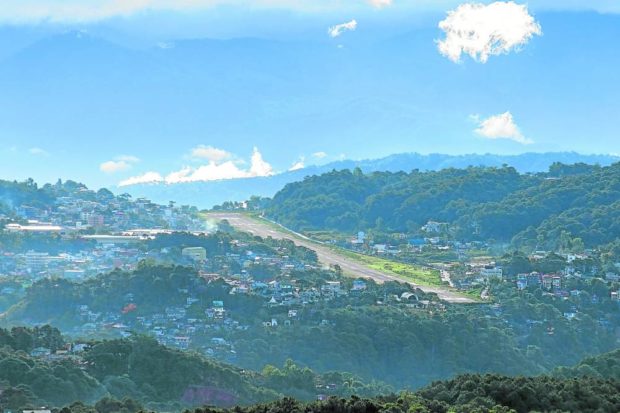
MILITARY LAND | The forested area at right, near the Baguio City airport in Barangay Loakan, is part of the military reservation overseen by the Philippine Military Academy. (File photo by NEIL CLARK ONGCHANGCO)
BAGUIO CITY, Benguet, Philippines — Observing that ancestral land titling in the summer capital has been “too slow,” the city council has urged the National Commission on Indigenous Peoples (NCIP) to hasten the process because unresolved land disputes have delayed city government programs like waste management.
Many government properties needed for projects have overlapped with ancestral land claims, and speeding up their titling would help segregate legitimate Ibaloy lots from state lands waiting to be developed, Councilor Betty Lourdes Tabanda said during the council’s session on Monday.
“We would like to honor all [Ibaloy land] claims that are legitimate, but you have to tell us which are legitimate … We don’t want to act and adversely affect any legitimate claimant. But what do we do? Shall we wait forever?” Tabanda, who chairs the environment committee, asked NCIP Baguio director Severino Lumiqued.
Original settlers
Lumiqued was invited to shed light on the status of a 158-hectare government lot near Mt. Santo Tomas, which is intended for a sanitary landfill and other waste processing facilities.
Ten applications for certificate of ancestral land titles (CALTs) within that city’s property have been pending for decades.
The NCIP, which was created by Republic Act No. 8371 (Indigenous Peoples Rights Act of 1997, or Ipra), issues ancestral land titles as part of its task “to protect and promote the interests and well-being of [indigenous peoples] with due regard to their beliefs, customs, traditions and institutions,” according to the agency’s website.
Ibaloys are the original settlers on the plateau where the American colonial government designed and built Baguio City in the early 1900s.
But since 2019, the NCIP authority over Baguio ancestral lands has been hamstrung by a Supreme Court decision that asserts that the city is excluded from Ipra’s general coverage.
The ruling, penned by now retired Senior Associate Justice Antonio Carpio, nullified 28 CALTs, citing Section 78, a special provision of Ipra.
“Under RA 8371, the NCIP is devoid of any power to reclassify lands previously included as part of the Townsite Reservation of Baguio City,” the high court said, stressing that “no new CALT or CADT (certificate of ancestral domain title) can be issued by the NCIP.”
Exceptions
As of 2022, 192 CALTs and the only Ibaloy domain title at Happy Hallow inside Camp John Hay have been issued in the city, and 148 more CALT applications remain pending, according to NCIP data.Lumiqued said his agency had issued new CALT guidelines for Baguio in 2020 that apply part of the Supreme Court’s ruling.
“While the Ipra does not generally authorize the NCIP to issue ancestral land titles within Baguio City, there are also recognized exceptions under Section 78,” part of the Supreme Court’s ruling read.
“These refer to (1) prior land rights and titles recognized and acquired through any judicial, administrative or other process before the effectivity of the Ipra; and (2) territories that became part of Baguio after the effectivity of the Ipra,” it added.